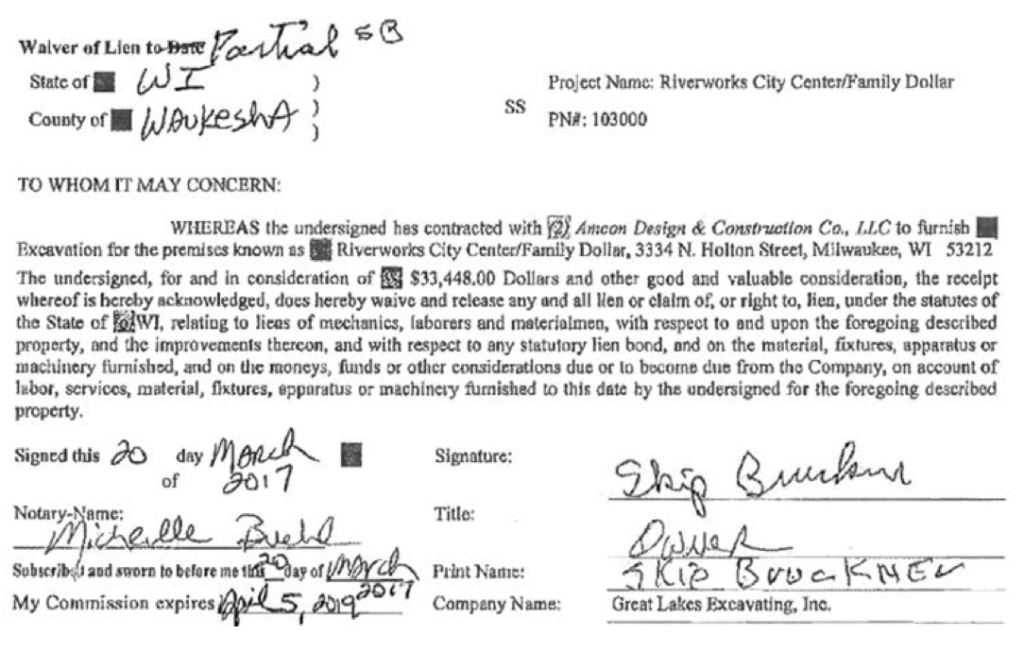
Despite the significant impact of a lien waiver on a contractor’s rights to payment, these documents are often executed and exchanged without a full appreciation of the implications. This is particularly true in the states where the form and content of lien waivers aren’t governed by statutory requirements, and Wisconsin is such a state. Plus, when claimants attempt to alter lien waivers through handwritten edits, it can lead to even more issues — as it did for a Wisconsin contractor last year. However, the Wisconsin Supreme Court recently overturned the previous court’s harsh decision on the matter.
Handwritten changes to a Wisconsin lien waiver causes serious issues
In early 2021, a Wisconsin appeals court dealt with a lien waiver that was, as printed, a full and final lien waiver, but included handwritten changes in an attempt to limit the waiver as a partial one. The court ultimately decided that, despite the handwritten changes, “changing the title of the lien waiver, without any additional explanation, does not specifically and expressly limit the waiver” as required by Wisconsin’s lien laws.
For full coverage on this appellate decision see: “Partial” Lien Waiver Costs Wisconsin Sub $180K in Lien Rights
But this wasn’t the end of the story, as the contractor once again appealed the decision to the Wisconsin Supreme Court, which ultimately ruled in favor of the contractor.
The case in question is Great Lakes Excavating, Inc. v. Dollar Tree Stores, Inc.
Project Snapshot:
- Property Owner: Riverworks City Center, LLC (Riverworks)
- Represented by: Steven J. Swalinski & Jessica K. Haskell of O’Neil Cannon Hollman DeJong & Laing, S.C.
- General Contractor: AMCON Design and Construction, Co., LLC (AMCON)
- Subcontractor: Great Lakes Excavating, Inc. (Great Lakes)
- Represented by: John E Machulak of Machulak Robertson & Sodos, S.C.
We covered most of the pertinent facts in our previous coverage of this case. But long story short: Great Lakes had an outstanding balance under their subcontract of $222,238. When AMCON was ready to pay $33,448, they provided a lien waiver form for Great Lakes to fill out. However, the waiver was a final waiver. So Great Lakes crossed out “final,” wrote in “Partial,” signed the waiver, and sent it back to AMCON.

When the additional $188,790 went unpaid, Great Lakes filed an action to foreclose on their lien claim. Both the trial court and the appeals court held that the waiver constituted a final waiver, and dismissed Great Lakes’ lien claim. However, this case made it all the way to the Wisconsin Supreme Court.
WI Supreme Court reverses strict enforcement of the printed waiver terms
On appeal, Riverworks continued their argument that the handwritten modification creates an ambiguity, because the printed body of the waiver otherwise constitutes a full waiver — and due to that ambiguity, it should be “construed against the person signing it.”
While the court agreed that ambiguities should be construed against the person who signed the waiver, they did not agree that the waiver was ambiguous at all. Here’s how they reached that decision.
The waiver is unambiguously partial
The court first addressed the inconsistency between the printed terms and the handwritten portions of the waiver. The printed text, read in isolation, constitutes a full waiver of all lien rights. However, the term “To Date” was crossed out and replaced with “Partial” in writing, which conflicts with the rest of the document.
So, how is this conflict resolved? Well, the court declared that since the document is a release, it should be analyzed under contract principles — despite Riverwork’s contention that a waiver isn’t a contract (no offer, acceptance, or consideration).
Under such principles, when handwritten provisions conflict with printed provisions, the handwritten provisions are given preference. The rationale underlying this approach is the need to determine the parties’ intentions, and handwritten provisions provide a “more recent and more reliable expression of [the parties’] intentions than is the language of the printed form.”
The court capped off this discussion by stating:
“Consistent with the principle that handwritten terms control over the form’s printed provisions, the term ‘Partial’ prevails over the language in the printed body of the document waiving all lien rights to date. Resolving this conflict leaves no ambiguity as to whether the document is a full or partial waiver. Because it can be only one or the other, there is no reasonable alternative construction of the document other than as a partial waiver.”
However, determining that the document is in fact a partial waiver doesn’t fully resolve the issue at hand.
The waiver is “specifically and expressly” limited to $33,448
To be a valid partial lien waiver in Wisconsin, the waiver must be “specifically and expressly” limited to a particular portion of the work performed. If the document fails to do so, the waiver could still be deemed ambiguous.
The court was particularly split on this issue. The majority held that the term “Partial” unambiguously applied to a particular portion of the work, represented by the amount of $33,448.
The dissent wasn’t as easily convinced, noting that the majority’s conclusion “rests on the false premise that when a party receives a certain amount of money in exchange for a waiver, it must be waiving its lien only up to that dollar amount,” and suggests Great Lakes could have accepted the $33,448 “in exchange for waiving its lien claims related to the original contract amount of $37,165,” or “any other dollar amount.”
Despite the dissent’s argument, the court concluded that the partial waiver “satisfies §779.05(1) because it is unambiguously partial — waiving Great Lakes’ lien right only in the amount of ‘$33,448’ — an amount representing the ‘particular portion’ of the work to which the waiver applies.”
Thus, the Supreme Court reversed the appellate court’s decision and held that:
“The construction lien waiver document on its face satisfies the statutory requirements of Wis.Stat. § 779.05(1) necessary to limit the waiver of Great Lakes’ lien rights. The document “specifically and expressly” restricts the lien waiver to ‘a particular portion of such labor, services, materials, plans, or specifications’ — the $33,448 received in consideration of the waiver.”
Thoughts from the attorneys on the case
This is an interesting conclusion to the dispute. On the one hand, mechanics liens are meant to protect contractors, so the ruling seems reasonable. On the other hand, this adds a level of unpredictability when it comes to waivers, which are exchanged frequently on construction projects. We reached out to the attorneys on each side of this case, and here’s what they had to say about the outcome.
“The case is important to contractors because the Supreme Court took a reasonable approach in its interpretation of the Wisconsin statute governing lien waivers,” said John Machulak, the attorney for Great Lakes. “This statute at issue had language that opened the door to technical arguments that many lien waivers intended to be no more that partial lien waivers in fact waived all lien rights.”
“Had the Court let stand the decision of the trial court and the Court of Appeals, many contractors could have unwittingly suffered the same fate as Great Lakes. Instead, the Supreme Court adopted the approach of using contract principles to interpret lien waiver documents, which ultimately focused on the intent of the parties. Riverworks, the owner, had argued that contract principles did not apply to waiver documents and the parties’ intent was irrelevant.”
One other takeaway is the need to be careful when signing a partial lien waiver. Most contractors do not enlist an attorney to draft or review a partial lien waiver. However, contractors should be careful when partial lien waivers are provided to owners.
Here, although it is entirely clear that Great Lakes intended to sign no more than a partial lien waiver, the trial court and the Court of Appeals previously ruled that the contractor’s intent was irrelevant. In other words, it took years of litigation and an appeal to the Supreme Court for Great Lakes to preserve its lien rights.
“Riverworks is disappointed by the decision of the Wisconsin Supreme Court,” said Steven Swalinksi, an attorney for Riverworks. “Section 779.05 prescribes simple and straight forward requirements for writing an effective partial lien waiver. Both the trial court and the Wisconsin Court of Appeals had correctly held that Great Lakes’ lien waiver did not comply with those requirements. The Supreme Court’s decision creates potential uncertainty for parties that must rely on lien waivers on a daily basis, including owners, lenders, title companies, and upper tier contractors.